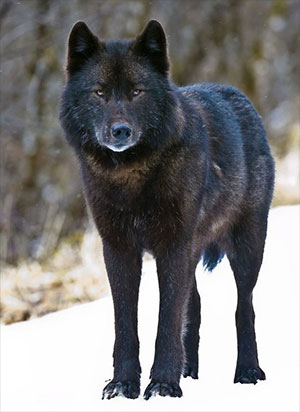
Southeast Alaska Wolf One Step Closer to Endangered Species Protection
August 06, 2021
“These beautiful wolves are threatened with extinction because of increased trapping and rampant logging in their forest home,” said Ted Zukoski, a senior attorney at the Center. “They’re vital to the health of the Tongass forest ecosystem, but they live in a sacrifice zone for timber mills. If these wolves are going to survive, they urgently need the Endangered Species Act’s protection, not traps and chainsaws.” The petitioners say the "rare" gray wolf subspecies, which inhabits the coastal rainforests of Southeast Alaska and British Columbia, faces numerous threats. Legal trapping recently killed more than half the wolves in one key population on Prince of Wales Island in Southeast Alaska. The Trump administration opened hundreds of thousands of acres of the wolf’s forest habitat to clearcut logging. And genetic evidence indicates the Prince of Wales population is in danger from high levels of inbreeding. The USFWS has recognized the Alexander Archipelago wolf (Canis lupus ligoni) as a subspecies of the gray wolf and as a listable entity. However, not all agree that this southeast wolf is a rare subspecies. Petitioners have again requested that the USFWS evaluate the Alexander Archipelago wolf subspecies for listing where Southeast Alaska constitutes a significant portion of the range. The petitioners say the best-available science demonstrates that the Alexander Archipelago wolf is threatened or endangered throughout all or a significant portion of its range. “Threats to the continued existence of these unique wolves have been worsening for many years, in terms both of habitat loss and mismanagement by the state and federal agencies that are responsible for maintaining the populations at a healthy size,” said Larry Edwards of Alaska Rainforest Defenders. The Fish and Wildlife Service determined that protecting Alexander Archipelago wolves may be warranted based on logging and road development, illegal and legal trapping and hunting, the effects of climate change and loss of genetic diversity and inbreeding. “The precarious position of these wolves is mainly driven by habitat loss and fragmentation caused by extensive logging and roadbuilding in old-growth forests,” said Nicole Whittington-Evans, Alaska program director, Defenders of Wildlife. “Wolves and other wildlife are dependent on intact old-growth habitat. Protecting our rare ancient forests is critical to conserving biodiversity and an important climate change mitigation strategy.” The petitioners say clearcut logging on the Tongass National Forest and adjacent state and private lands destroys and fragments the old-growth forest habitat that wolves rely on for raising pups and hunting their primary prey, Sitka black-tailed deer. Road construction for logging operations also allows increased access for trappers and hunters. In recent years the U.S. Forest Service has authorized intensive old-growth logging and road building concentrated in the wolves’ most important habitat, including the largest timber sale in any national forest in 30 years. That’s despite direction in the Tongass land management plan to move away from old-growth logging. In 2020 the Trump administration increased threats to the wolves by exempting the Tongass National Forest from the roadless area conservation rule, opening 168,000 additional acres of irreplaceable old-growth forest to clearcut logging. Conservation groups sued to restore those protections. Earlier this month the Biden administration announced the Forest Service will restore roadless protections to the Tongass and cancel three major timber projects. This new initiative to spare old and mature forests on the Tongass from large-scale logging promises to reduce future destruction of wolf habitat. But the wolf’s low numbers, mismanagement of trapping, damage from past national forest logging, continued intensive logging of old forests on state lands and likely inbreeding means the animal is still threatened with extinction say the petitioners. On Prince of Wales Island, which harbors a focal population of these wolves, an unprecedented 165 wolves were killed during the 2019-2020 trapping season. According to the petitioners, this alarming slaughter occurred after state and federal wildlife managers ignored the recommendations of their wolf management program and eliminated limits on the number of wolves that could be trapped or hunted. State and federal officials authorized a 21-day trapping season on Prince Wales Island during November and December 2020 with no limit on wolf killing. The season’s death toll was 68 wolves, the second-highest level of legal killing since 2005. In 2016 the Fish and Wildlife Service denied Endangered Species Act protection to Alexander Archipelago wolves largely based on the claim that wolf populations in British Columbia were stable, while acknowledging the more precarious status of wolves in Southeast Alaska. The petitioners say threats to the wolves in Alaska have escalated since 2016 because of inadequate federal and state management, the Trump administration’s elimination of protections across much of their habitat, and continued logging and road building on multiple forestland ownerships. Protection under the Act would require state and federal agencies to better manage threats to the wolves, take measures that protect their habitat and limit hunting and trapping say the petitioners.
Edited By Mary Kauffman, SitNews
Source of News:
|
||||
